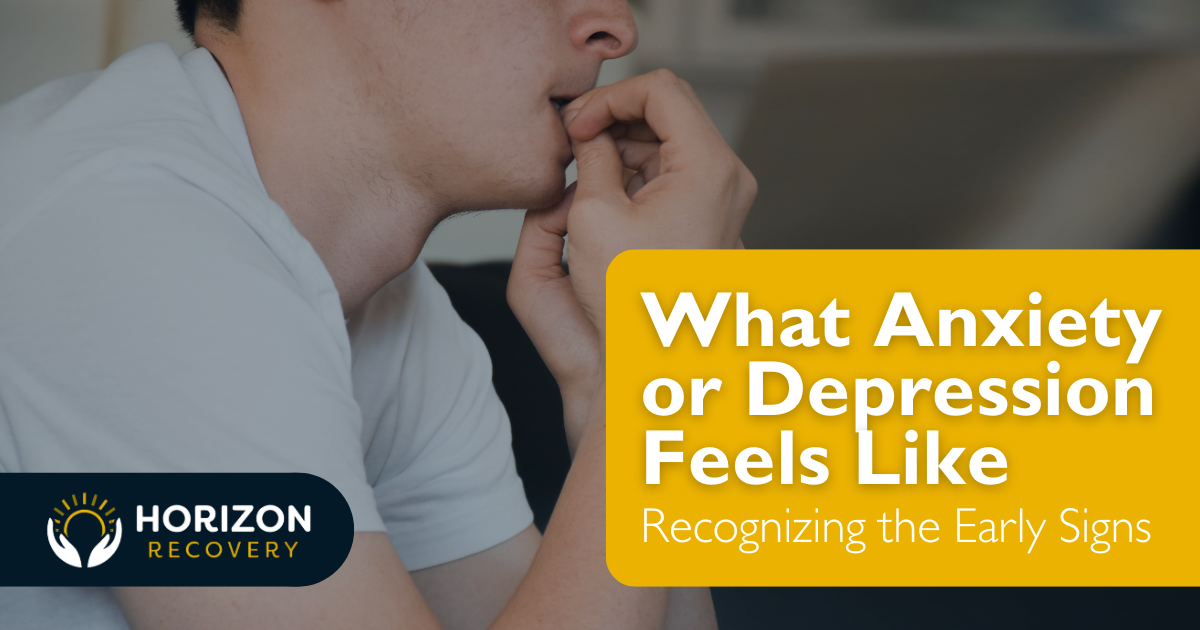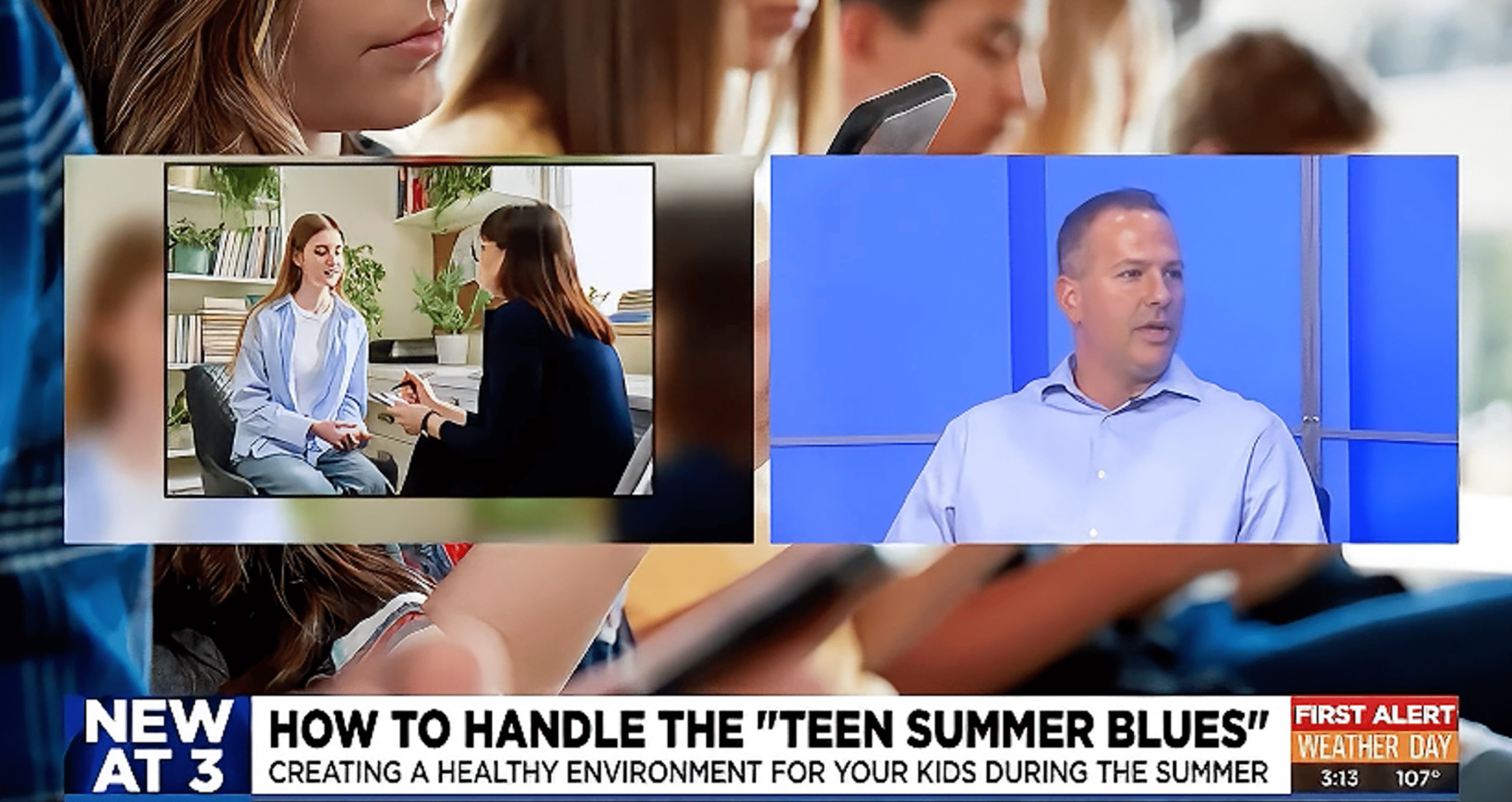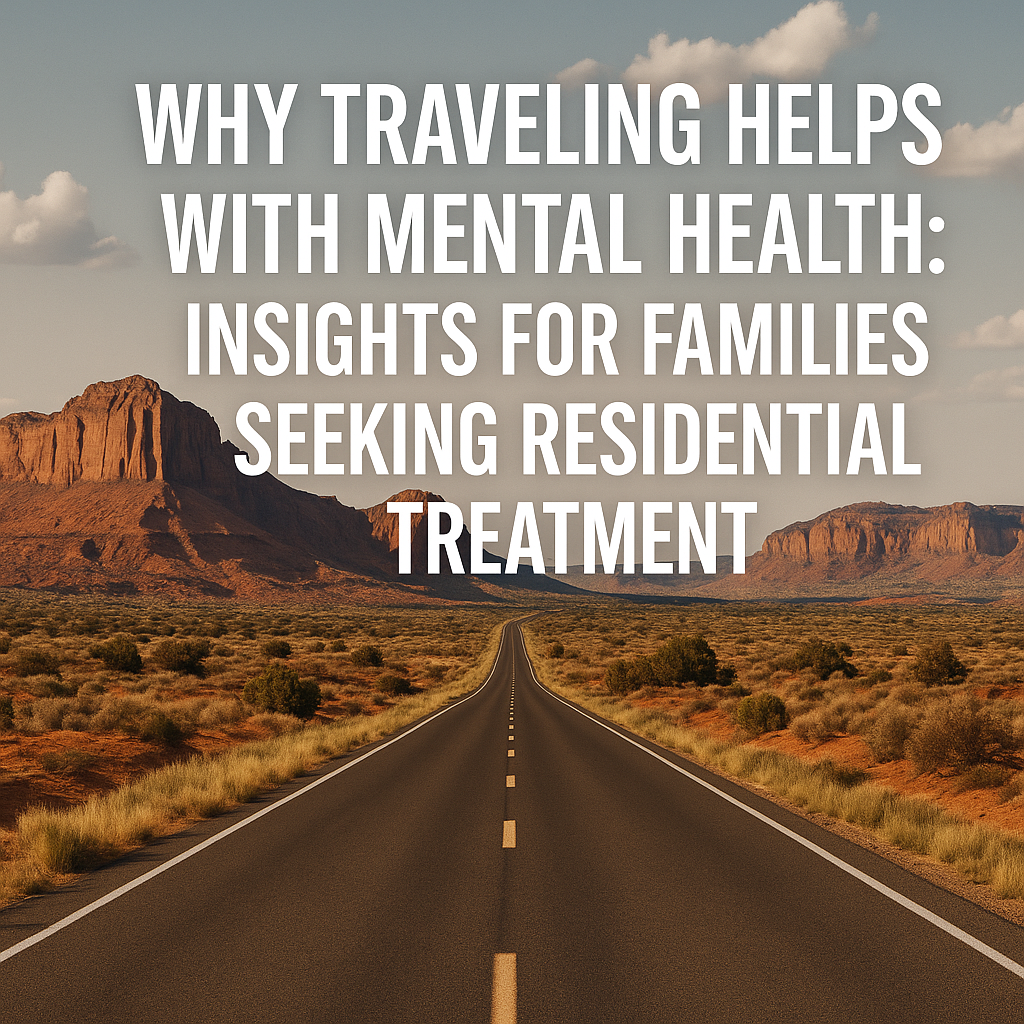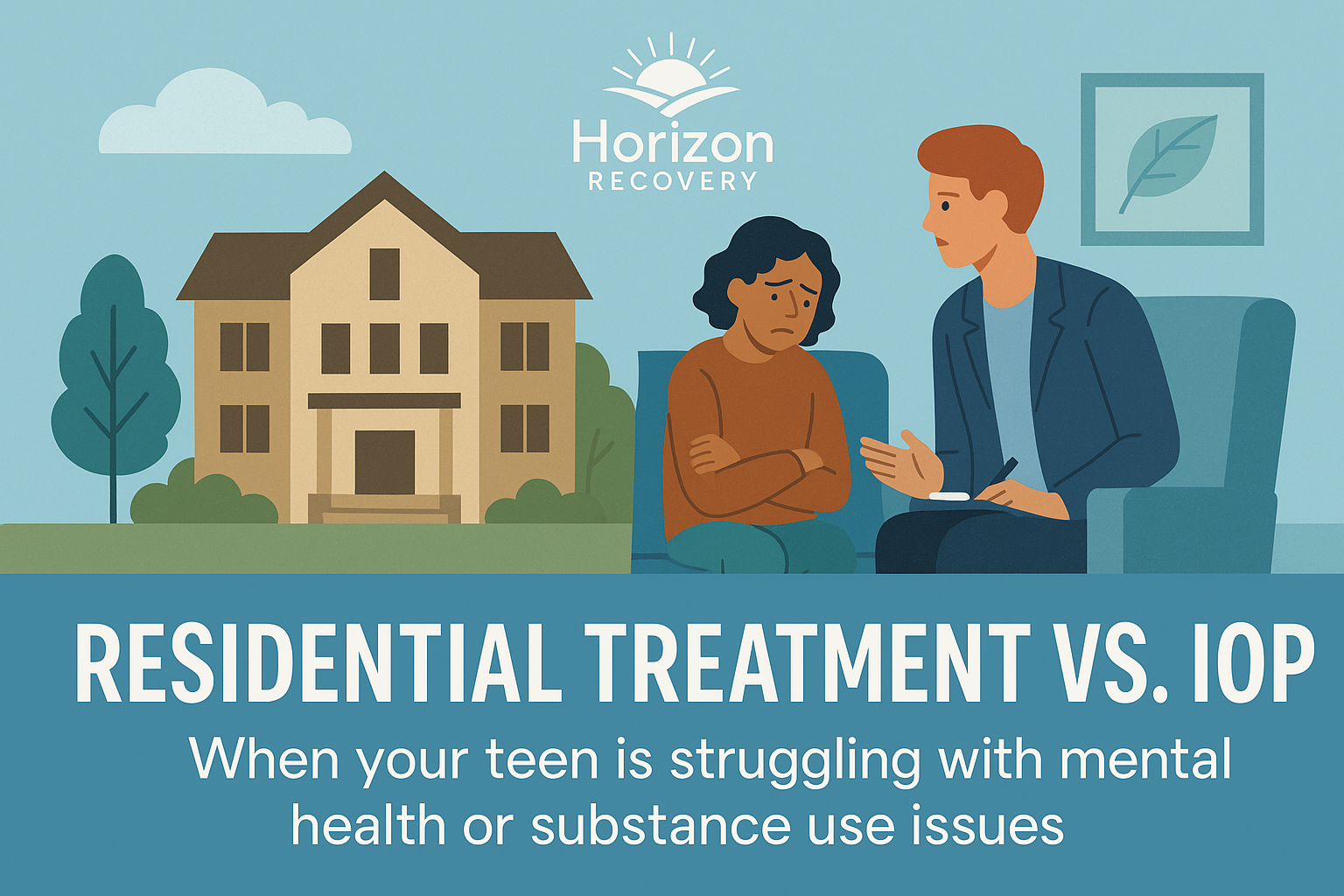What Anxiety or Depression Feels Like: Recognizing the Early Signs

Being a teenager comes with a lot of emotions—one day, you’re excited and full of energy, and the next, you feel completely drained. It’s normal to experience ups and downs, but sometimes, those feelings don’t go away.
If you’ve been wondering, “Am I feeling normal or is this anxiety?” or asking yourself, “How do I know if I have anxiety as a teen?”, you’re not alone.
Anxiety and depression are common among teenagers, but they often go unnoticed.
Understanding the early signs of anxiety and depression in teenagers can help you recognize when it’s time to reach out for support.

What Does Teenage Depression Feel Like?
Depression isn’t just feeling sad—it’s a deep, lasting sense of hopelessness, exhaustion, or numbness. If you’re struggling with depression, you might feel like nothing excites you anymore, even the things you used to love. It can make you feel alone, misunderstood, and like things will never get better.
Executive Perspectives:
Brian Carlisle, RN, FNP-C, MSLE Administrator | Horizon Recovery “Throughout my years as a first responder, I’ve witnessed how anxiety and depression often communicate through the body first—unexplained stomachaches, persistent fatigue, or racing hearts—physical signals that arrive long before teens can put words to the emotional storm brewing inside them.”
Patrick Buehl Executive Director | Horizon Recovery “A profound transformation occurs when teens realize their anxiety or depression isn’t a character flaw but a health condition deserving of care and attention, allowing them to finally approach their struggles with the same compassion they would offer a friend facing similar challenges.”
Here are some signs that what you’re experiencing might be teenage depression:
1. You Feel Tired All the Time
Depression can make even the simplest tasks like getting out of bed, brushing your teeth, or answering a text, feel exhausting. No matter how much you sleep, you might still feel completely drained.
2. You Don’t Enjoy Things Like You Used To
Do you remember a time when hanging out with friends or playing your favorite sport made you happy?
If those activities don’t bring you joy anymore, it could be a sign of depression. Losing interest in hobbies, school, or relationships is a major red flag.
3. You Feel Hopeless or Like Nothing Matters
You might catch yourself thinking, “What’s the point?” or “Nothing is ever going to get better.”
Depression can make it feel like there’s no way out of your situation, but that’s not true, help is available, and things can improve.
4. You’ve Been Eating More or Less Than Usual
Changes in appetite, either eating way more than usual or barely eating at all, can be a sign that something isn’t right.
Depression can affect your relationship with food, sometimes without you even realizing it.
5. You Feel More Irritable or Angry
While many people think of depression as just sadness, it can also show up as frustration or anger. You might snap at people over small things, feel annoyed all the time, or struggle with sudden mood swings.
6. You Want to Be Alone All the Time
If you’ve been withdrawing from friends and family, skipping social events, or avoiding people altogether, then it could be a sign of depression. Isolation often makes things worse, but it can feel like the only option when you’re struggling.
7. You Have Thoughts of Self-Harm or Suicide
If you’ve been having thoughts about hurting yourself or ending your life, then please know that you are not alone, and help is available. These feelings can be overwhelming, but they do not have to control you. Talk to someone you trust or reach out to a crisis support line. Help is always within reach.
How Do I Know If I Have Anxiety as a Teen?
Anxiety isn’t just nervousness before a test or a big event, it’s an overwhelming feeling of fear, worry, or panic that doesn’t go away. It can make your heart race, your thoughts spiral, and your body feel like it’s constantly on edge.
If you’ve been asking yourself, “Am I feeling normal or is this anxiety?”, here are some early signs of anxiety to look out for:
1. You Worry All the Time
Does your mind constantly race with “what if” questions?
Do you feel like you can’t stop overthinking things?
Excessive worry, especially about things that aren’t in your control, can be a key sign of anxiety.
2. Your Heart Races or You Feel Short of Breath
Anxiety can trigger physical symptoms like a racing heartbeat, sweating, dizziness, or even feeling like you can’t catch your breath.
If you’ve ever felt like your body is in “panic mode” for no clear reason, anxiety might be the cause.
3. You Have Trouble Sleeping
If you lie awake at night with racing thoughts, or wake up feeling restless and exhausted, anxiety might be affecting your sleep. Insomnia is a common symptom of both anxiety and depression in teenagers.
4. You Feel Restless or On Edge
Do you find yourself fidgeting, pacing, or feeling like you can’t sit still? Anxiety can make it hard to relax, even when you have no real reason to feel stressed.
5. You Avoid Certain Situations or People
Anxiety can make you avoid things that trigger your stress, whether that’s speaking in class, going to social events, or even texting people back.
If fear is keeping you from doing things you normally would, it might be time to seek support.
6. You Get Frequent Stomachaches or Headaches
Anxiety doesn’t just affect your mind, it can impact your body too. Many teens with anxiety experience unexplained headaches, stomach pain, or nausea, especially in stressful situations.
7. You Have Panic Attacks
Panic attacks are sudden waves of intense fear that can make you feel like you’re losing control. They often come with symptoms like dizziness, a racing heart, sweating, shaking, or feeling like you can’t breathe.
If you’ve experienced this, you’re not alone. Panic attacks are common in people with anxiety.
How to Tell If I’m Struggling with Depression as a Teen
If you’ve read through these signs and recognized yourself in them, you might be struggling with anxiety or depression.
The good news? Help is available, and things can get better.
Here’s what you can do:
1. Talk to Someone You Trust
Whether it’s a parent, teacher, counselor, or close friend, opening up about your feelings is an important first step. You don’t have to go through this alone.
2. Seek Professional Help
Therapists and counselors specialize in helping teens understand their emotions and develop coping strategies.
If you’re unsure where to start, a school counselor or doctor can help connect you with resources.
3. Take Care of Your Body
Getting enough sleep, eating healthy foods, and exercising regularly can help improve mental health. Small changes like going for a walk, listening to music, or practicing deep breathing can make a difference.
4. Challenge Negative Thoughts
Anxiety and depression often bring self-critical thoughts like, “I’m not good enough” or “Nothing will ever get better.”
Try to recognize these thoughts for what they are—symptoms of your mental health struggles, not reality.
5. Reach Out for Crisis Support If Needed
If you’re feeling overwhelmed, hopeless, or have thoughts of self-harm, please reach out for help right away. You can call or text 988 for free, confidential support from trained professionals.
Seek Support if You’re Dealing with Anxiety or Depression
If you’ve been wondering, “How do I know if I have anxiety as a teen?” or “What does teenage depression feel like?”, remember that mental health struggles are real—but they are also treatable.
You are not alone. You deserve support, and there are people who care about you and want to help. Reaching out for help is a sign of strength, not weakness.
If you think you might be struggling with anxiety or depression, consider reaching out to Horizon Recovery. We specialize in treating addiction and co-occurring mental disorders such as anxiety in teenagers and adolescents. Our team is here to help you.
More posts like this
.svg)
Guiding your teen’s path to mental clarity, sobriety, and a hopeful future.
For more information or to schedule a visit, please reach out to us today. Our empathetic and caring team is here to support you every step of the way.
.svg)
.jpg)
.svg)
.svg)


